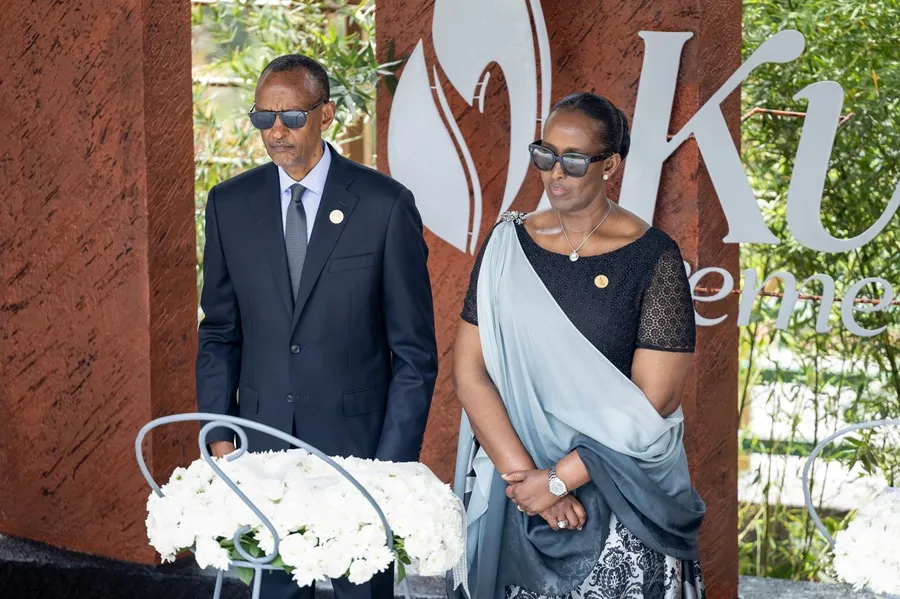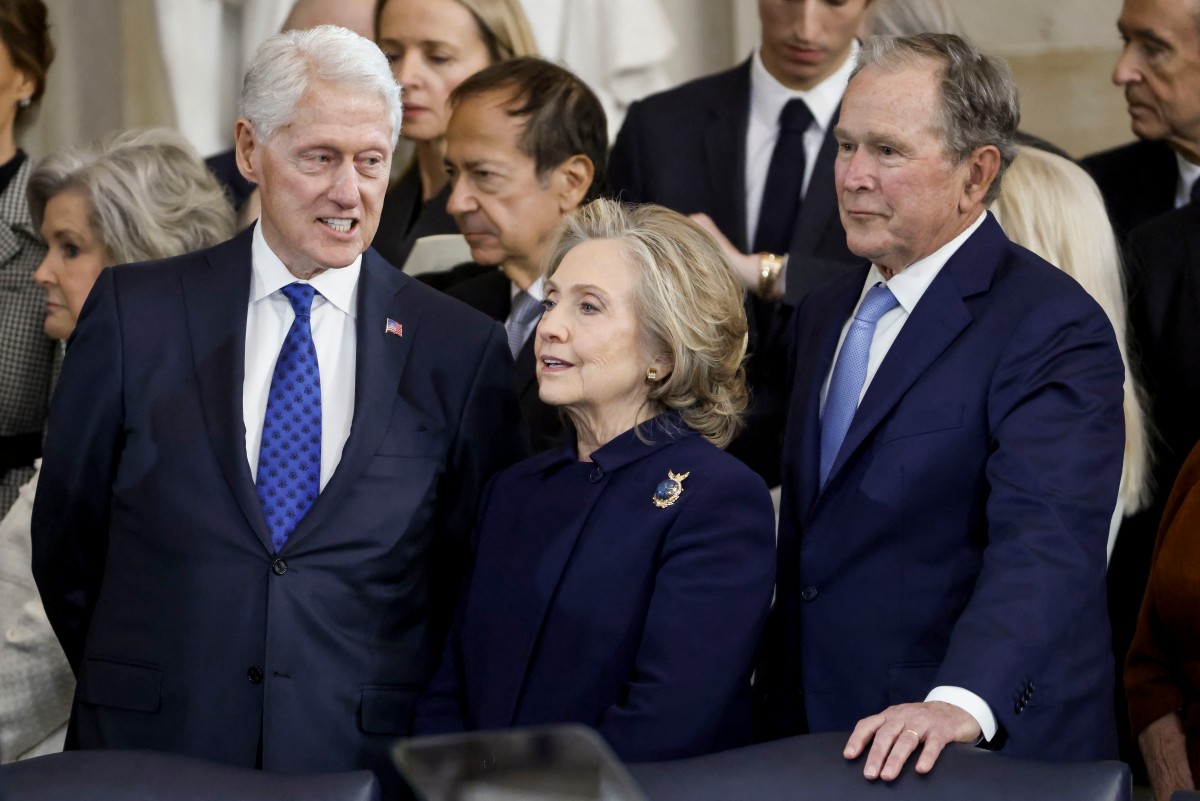International
Rwanda begins the commemoration of the thirtieth anniversary of the 1994 genocide

Rwanda began this Sunday the hundred days of mourning established by the country to commemorate the thirtieth anniversary of the 1994 genocide in which more than 800,000 moderate Tutsis and Hutus were killed, a massacre that still shookes the world and Rwandan society.
To begin the commemoration, the country’s president, Paul Kagame, lit accompanied by the first lady, Jeannette, the traditional flame of remembrance at the Center in Memory of the Genocide in the capital, Kigali, where more than 250,000 victims of the massacre lie in mass graves.
In a solemn act with moments of silence only interrupted by the commemorative songs singed by a military band and by the protocol instructions, a dozen heads of state and government paid their respects to the white cement blocks where the graves of the victims are housed.
Among the leaders present were the Prime Minister of Ethiopia, Abiy Ahmed, and the presidents of South Africa, Cyril Ramaphosa; Central African Republic (RCA), Faustin-Archange Touadera; Madasgascar, Andry Rajoelina; South Sudan, Salva Kiir; Republic of the Congo, Denis Sassou Nguesso; Tanzania, Samia Suluhu Hassan; and the Czech Republic, Petr Pavel.
Likewise, the head of state of Mauritania and current president of the African Union (AU), Mohamed Ould Ghazouani, and the president of Israel, Isaac Herzog, attended on the same day that it is precisely six months since the beginning of the war in the Gaza Strip, for which Tel Aviv faces accusations of genocide in the International Court of Justice (ICJ).
Several former presidents, including the American Bill Clinton or the French Nicolás Sarkozy, as well as the president of the AU Commission, Moussa Faki Mahamat, and the president of the European Council, Charles Michel, also traveled to Kigali to join the memory acts.
The commemoration program that starts today throughout the country includes the prohibition of large celebrations, such as weddings or sports competitions, and the organization of concerts and other cultural or leisure events not related to genocide in bars and public spaces.
In addition, within the framework of these events, the United Nations Educational, Scientific and Cultural Organization (UNESCO) has issued new certificates to register four other monuments commemorating the genocide as world heritage sites, in Kigali, Bisesero (west), Nyamata (southeast) and Murambi (south).
“This means the international recognition that what happened in Rwanda is a tragedy, not only for Rwanda but also for the entire international community, all of humanity,” the director general of Unesco, Audrey Azoulay, told the press on Friday.
The one hundred days of mourning marked by the Rwandan Government will conclude on April 13 with an act at the Center for the Memory of the Genocide of Rebero (Kigali), in memory of the politicians who were killed for opposing the massacre.
The genocide began on April 7, 1994 after the murder the day before of the presidents of Rwanda, Juvénal Habyarimana, and Burundi, Cyprien Ntaryamira (both Hutus), when the plane in which they were traveling was shot down over Kigali.
The massacre that followed – the Rwandan Government accused the Tutsi rebels of the Rwandan Patriotic Front (RPF) of the murder, against whom it had been waging a war since 1990 – caused the death of at least 800,000 moderate Tutsis and Hutus in just over three months.
The genocide was one of the worst ethnic killings in the recent history of humanity.
Paul Kagame warned this Sunday in his speech that the conditions for an ethnic killing can occur anywhere if they are not controlled.
“The process of division and extremism that leads to genocide can occur anywhere if it is not controlled,” the president said in a forceful intervention before about 3,500 people gathered at the imposing BK Arena stadium in Kigali.
He defined any “ambiguity” about who were the victims of the genocide as “a form of denialism, which constitutes a crime.”
The president referred to the situation in the east of the neighboring Democratic Republic of the Congo (DRC), whose Kigali Army he accuses of supporting the rebel group Democratic Forces for the Liberation of Rwanda (FDLR), founded in 2000 by leaders and other Hutu Rwandans exiled in that country.
“The remains of those forces (perpetrators of the killing) are still in the east of the Congo today,” Kagame said, assuring that they have the “full support of the blue helmets of the United Nations” and that “their objectives have not changed.”
International
Federal Judge Blocks Trump Policy Allowing Deportations to Third Countries

A federal judge ruled on Wednesday that the policy of U.S. President Donald Trump’s administration allowing immigration authorities to deport foreign nationals to third countries without prior notice or the opportunity to object is unlawful. The decision marks another legal setback for the administration on immigration matters.
Judge Brian Murphy of the U.S. District Court for the District of Massachusetts struck down the regulation issued last year, which stated that Immigration and Customs Enforcement (ICE) was not required to notify migrants if they were to be sent to countries other than the one listed in their removal order, provided that receiving nations offered assurances they would not face persecution or torture.
Murphy ordered the measure vacated but granted a 15-day delay before the ruling takes effect, giving the Trump administration time to file an appeal.
In his decision, the judge concluded that the policy violates federal immigration law and migrants’ due process rights. He also questioned the lack of transparency surrounding the alleged assurances provided by receiving countries, stating that “no one really knows anything about these supposed ‘assurances.’” He added, “It is not right, and it is not lawful.”
The ruling follows several legal disputes involving deportations to third countries. Last year, the executive branch deported more than 200 Salvadorans to a maximum-security prison in El Salvador, invoking an old wartime law. The White House also held talks with Costa Rica, Panama, and Rwanda about receiving migrants who are not citizens of those countries.
In May, the same judge determined that the government violated a court order when it attempted to remove a group of immigrants with criminal records to South Sudan without prior notice or an opportunity to raise claims of fear of persecution.
Although President Donald Trump took the case to the U.S. Supreme Court, which temporarily allowed the deportations to resume while a final decision was pending, the White House is expected to again appeal to higher courts to overturn this latest judicial ruling.
International
Cocaine Production Surges 34% in 2023 as Market Expands into Africa and Asia

The global cocaine market is the fastest-growing among all illicit drugs worldwide, the International Narcotics Control Board (INCB) warned on Thursday in its annual report presented in Vienna.
The body attributes this expansion to the sustained rise in production in South America — particularly in Colombia — as well as increasing demand in emerging regions such as Africa and Asia.
According to the report, global cocaine production surpassed 3,700 metric tons in 2023, marking a 34% increase compared to 2022. This growth is largely driven by the expansion of illicit coca cultivation in Colombia and the greater production capacity of clandestine laboratories.
The INCB noted that the market has not only grown in volume but has also diversified and become more globalized. While Europe and North America remain the primary destinations, trafficking routes now reach “all regions of the world,” including Africa — traditionally considered a transit zone — and Asia, where the presence of cocaine was previously marginal.
In Western and Central Europe, for the fifth consecutive year, seizures in 2023 exceeded those in North America, consolidating the region as the leading destination market. Between January 2019 and June 2024, more than 1,826 metric tons of drugs bound for European ports were seized, of which 82% was cocaine, equivalent to 1,487 metric tons.
The report also highlights that seizures in Africa rose by 48% in 2023 compared to 2022, reflecting the expansion of the market on the continent. Globally, the number of cocaine users increased from 17 million in 2013 to 25 million in 2023.
International
Clinton Accuses Republican Committee of Using Epstein Case to Shield Trump

Former U.S. Secretary of State and former First Lady Hillary Clinton denied on Thursday before a congressional committee that she had ever met convicted sex offender Jeffrey Epstein in person or had any knowledge of the crimes he committed.
Clinton testified behind closed doors from New York before the House Oversight Committee. The wife of former President Bill Clinton — who is scheduled to testify on Friday — accused the Republican-controlled committee of summoning her in order to “distract attention” and “cover up” the activities of President Donald Trump, who had past ties to Epstein.
“I do not recall ever meeting Mr. Epstein. I never flew on his plane nor visited his island, his homes, or his offices. I have nothing further to add,” she stated.
The former Secretary of State emphasized that she “had no idea about the criminal activities” of the financier, who died in prison in 2019. “Like any decent person, I was horrified when I learned of his crimes,” she said.
Clinton described the Epstein case as “a tragedy” and “a scandal” that deserves “a thorough investigation,” but criticized the committee for failing to summon what she called the truly relevant individuals.
“Instead, you have asked me to testify, knowing that I have no knowledge that would serve your investigation, with the purpose of distracting from President Trump’s activities and shielding him despite the legitimate demand for answers,” she said.
The questioning, conducted behind closed doors in Chappaqua, New York — where the Clintons reside — took place one day before former President Bill Clinton was scheduled to appear at the same location.
Although the Clintons initially declined to testify before Congress, the threat of being held in contempt ultimately led the former presidential couple to agree to appear and explain their relationship with Epstein.
-

 International2 days ago
International2 days agoFamily of “El Mencho” Seeks Return of Body After Deadly Military Operation
-

 International2 days ago
International2 days agoLarry Summers Steps Down from Harvard Role Amid Epstein Controversy
-

 International2 days ago
International2 days agoIran’s President Optimistic Ahead of Geneva Nuclear Talks with U.S.
-

 International2 days ago
International2 days agoBill Gates Admits “Serious Mistake” Over Epstein Ties
-

 International2 days ago
International2 days agoStephen Hawking Photo Appears in Newly Released Epstein Documents
-

 International4 days ago
International4 days agoOver 40 Million Affected by Major Snowstorm in Northeastern U.S.
-

 International4 days ago
International4 days agoNine People Killed in Two Armed Attacks in Manabí, Ecuador
-

 International23 hours ago
International23 hours agoCocaine Production Surges 34% in 2023 as Market Expands into Africa and Asia
-

 International23 hours ago
International23 hours agoClinton Accuses Republican Committee of Using Epstein Case to Shield Trump
-

 International23 hours ago
International23 hours agoFederal Judge Blocks Trump Policy Allowing Deportations to Third Countries




























